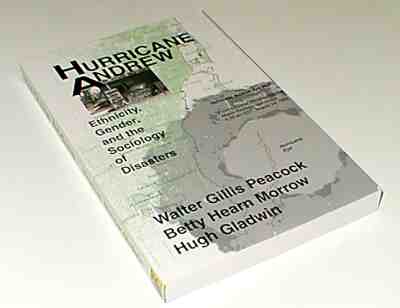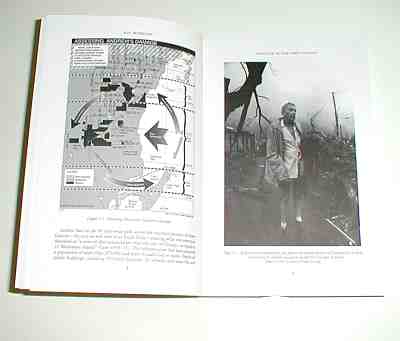In the years following Hurricane Andrew IPOR has conducted many studies that have been a key element in the multidisciplinary effort of FIU's Hurricane Andrew research team. Reviewers have stated that it is a benchmark example of how to study of effects of a major disaster on a complex urban area. It is also an excellent example of how survey research can work with other types of research and data (qualitative as well as quantitative). Analysis and reporting are also multi-focused, linking a range of techniques from logistic regression to ethnographic description. The book can be purchased by sending an order to the International Hurricane Research Center at FIU, or at the IPOR lab, room 301 AC II, Florida International University Biscayne Bay Campus. The cost is $20.


Excerpts from reviews of Hurricane Andrew: Ethnicity, Gender and the Sociology of Disasters
In my 30 years of reading disaster case studies this is by far the best! Peacock, Morrow, and Gladwin have done a superb job of weaving together the findings of nine separate research projects. . .into an engaging examination of how race, ethnicity, class, and gender interact in a disaster context. Hurricane Andrew is essential reading for anyone interested in the sociology of disaster and emergency management issues. This work addresses areas long neglected in the disaster research literature. An added bonus is the excellent local maps, well-crafted figures, and visually powerful Miami Herald photographs.
Thomas R. Forrest, Contemporary Sociology, 1999, 28 (3): 328-329.
[Hurricane Andrew] is fascinating and has opened my eyes to a whole new way of looking at my research area. This must be an essential text for all of those in the emergency and contingency planning field, especially with regard to the longevity of the after-care requirements and the dramatic and potentially crippling effect that such events can have on families and communities.
H. C. Wilson, Disaster Prevention and Management, 1998, 7 (1): 71
If there are still some, people out there who think of disaster research as glorified sociological ambulance chasing, this edited volume on how Hurricane Andrew affected residents and communities in southern Florida should set the record straight. . . . This volume written in the spirit of City on the Edge, Urban Fortunes, and other work on the "political economy of place" concludes by documenting the hurricane-induced changes that have begun to occur. Its theoretical approach and findings will interest not only disaster specialists but also urban sociologists, planners, regional scientists, and race, gender, and public policy researchers.
Kathleen J. Tierney, American Journal of Sociology, 1999, 104(5): 1557-9
This book is a well-integrated collection of articles on the impact of a hurricane by a research team, many of whom were victims themselves. Since the entire team worked together as they divided into smaller groups to study specific issues, they were able to share a common theoretical orientation and take care to address all relevant questions. As a result, in contrast to most edited volumes, the coherence and development of the book are impressive. I highly recommend this book to researchers, policy-makers, and teachers interested in the area of disasters.
Mary Lou Wylie, American Anthropologist, 1999, 101 (3): 685-6.